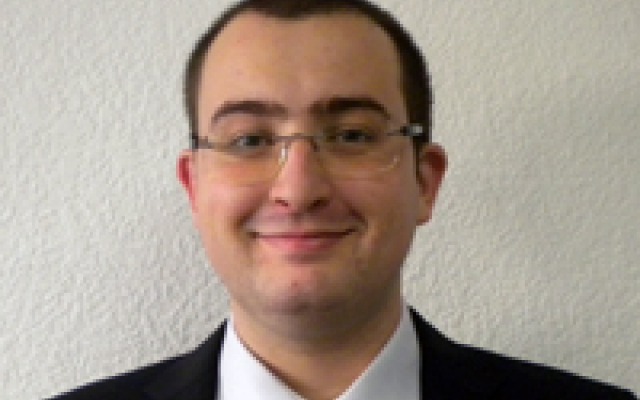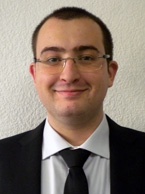research
Reference PhD student is chosen to present job market paper at Econometric Society Winter Meeting

A doctoral student in the UAB’s International Doctorate in Economic Analysis (IDEA), Pau Pujolàs, has been selected to present his job market paper at the prestigious 2012 European Winter Meeting of the Econometric Society in Konstanz, Germany. The paper, “Trade Patterns, Income Differences and Gains From Trade,” is one of 16 research papers selected from nominations by senior researchers across Europe.
According to the Econometric Society event page, many of today's leading European economists started their careers by presenting their first major paper at one of the Winter Meetings. Those invited to participate are considered “the most promising young European researchers.”
Mr. Pujolàs is glad for the opportunity to present his paper to the Econometric Society. “It is a great opportunity to present in front of the best European researchers, and I am sure I will get a lot of really valuable feedback,” he said. He is also looking forward to getting his work into circulation before going to the job market, which might lead to interviews later on.
A state-of-the-art model
In his paper, Mr. Pujolàs and co-author Wyatt Brooks (University of Notre Dame) study cross-country income differences and their implications for trade patterns.
“How better off is the world economy thanks to international trade? Even more important, how are developing countries better off thanks to international trade? I find these questions really important by themselves,” he said. “We knew that consumption increases, and hence, international trade in general, makes the world better off. But the question is, how does the pattern of this consumption increase for different income levels?”
The model that Mr. Pujolàs and Mr. Brooks construct in their paper factors in inequality within and across countries, population and production differences, and actual trade flows. “The preliminary results confirm that standard welfare measurements may underestimate gains from trade by up to 500% for countries like South Africa,” Mr. Pujolàs said.
BSE Affiliated Professor Juan Carlos Conesa (UAB and BSE) supervised Mr. Pujolàs' thesis. He notes that the paper provides a fresh new look at the data and finds patterns that had not been discussed before.
“Pau and Wyatt build a state-of-the-art model of international trade with heterogeneous producers and consumers that can be mapped into the empirical evidence. Based on that model they find large gains from trade, challenging current established wisdom," Prof. Conesa said.
He attributes part of Mr. Pujolàs’ success as a researcher to the passion he shows for his work. "If you want to excel, you have to be passionate about what you do. Pau is a great example of that for all of us, students and faculty alike,” Prof. Conesa said. “He is genuinely passionate about doing research and about economics in general. His enthusiasm is contagious, that is why it is so rewarding (and so much fun too) to have him as a graduate student of the IDEA doctoral program at the UAB.”

Pau Pujolàs (PhD candidate, IDEA) is one of just 16 doctoral students chosen to present his job market paper at the Econometric Society's 2012 European Winter Meeting in Konstanz, Germany.
Support and opportunities from the IDEA doctoral program
IDEA is one of the BSE’s reference PhD programs. Mr. Pujolàs is very enthusiastic about the program and the opportunities he has had there to develop his research.
“I couldn't be happier with the support to my research given by the PhD. Within this community of excellent professors and students, I had the really good luck to have Prof. Conesa as my PhD thesis advisor, who has (very patiently) guided me in my research.”
He also had the chance to complement his PhD work with experiences at the University of Minnesota and the Federal Reserve Bank. “It was precisely Prof. Conesa who sent me to Minnesota. His PhD thesis advisor, Tim Kehoe [also a frequent guest professor at the BSE], agreed to have me visit the department, where I joined their international trade workshop. I had the opportunity to go back again this August, this time at the Fed, to continue my research.”
After presenting his paper to the Econometric Society and finishing his PhD, Mr. Pujolàs would like to continue in academia and economic research. As he did during his doctoral studies, he will consider options both in Catalonia and abroad.
Paper Abstract:
Trade Patterns, Income Differences and Gains From Trade [pdf]
Quantifying the gains from international trade is an area of research that has been widely studied using a variety of trade models. At the same time, it has been shown that non-homotheticities are useful for matching the systematic patterns of trade present in disaggregated trade data. We bring these two literatures together to ask how non-homotheticities a¤ect our predictions for gains from trade. To do so, we develop a N-country trade model that exactly matches bilateral trade, population, GDP per capita and within country income inequality for many countries. We include non-homotheticities to match patterns of trade between rich and poor countries that we observe in highly disaggregated trade data. We then make use of the results from Arkolakis, Costinot, and Rodriguez-Clare (2012), which gives a simple formula for gains from trade in a large class of homothetic models, including a version of our model with the non-homotheticity removed. Our main …nding is that homothetic models overestimate gains from trade in countries with small populations and low productivities, and underestimate gains in countries with large populations and high productivities. The homothetic model overestimates the gains from being open to trade in the U.S. and Japan by 14% and 22%, and underestimates them in Spain and Italy by 24% and 14%.
Download thesis paper [pdf]:
Trade Patterns, Income Differences and Gains From Trade
